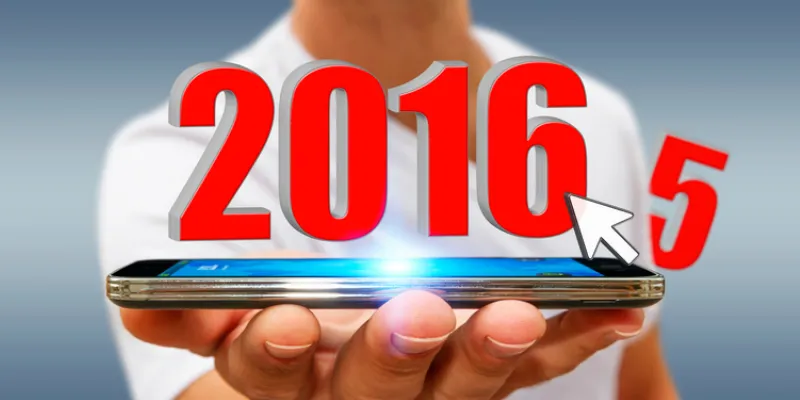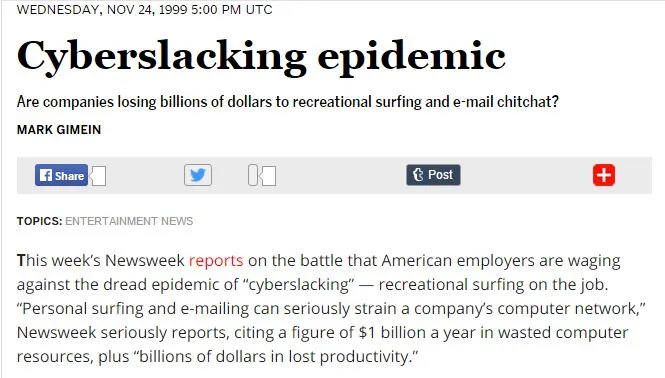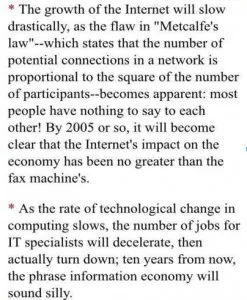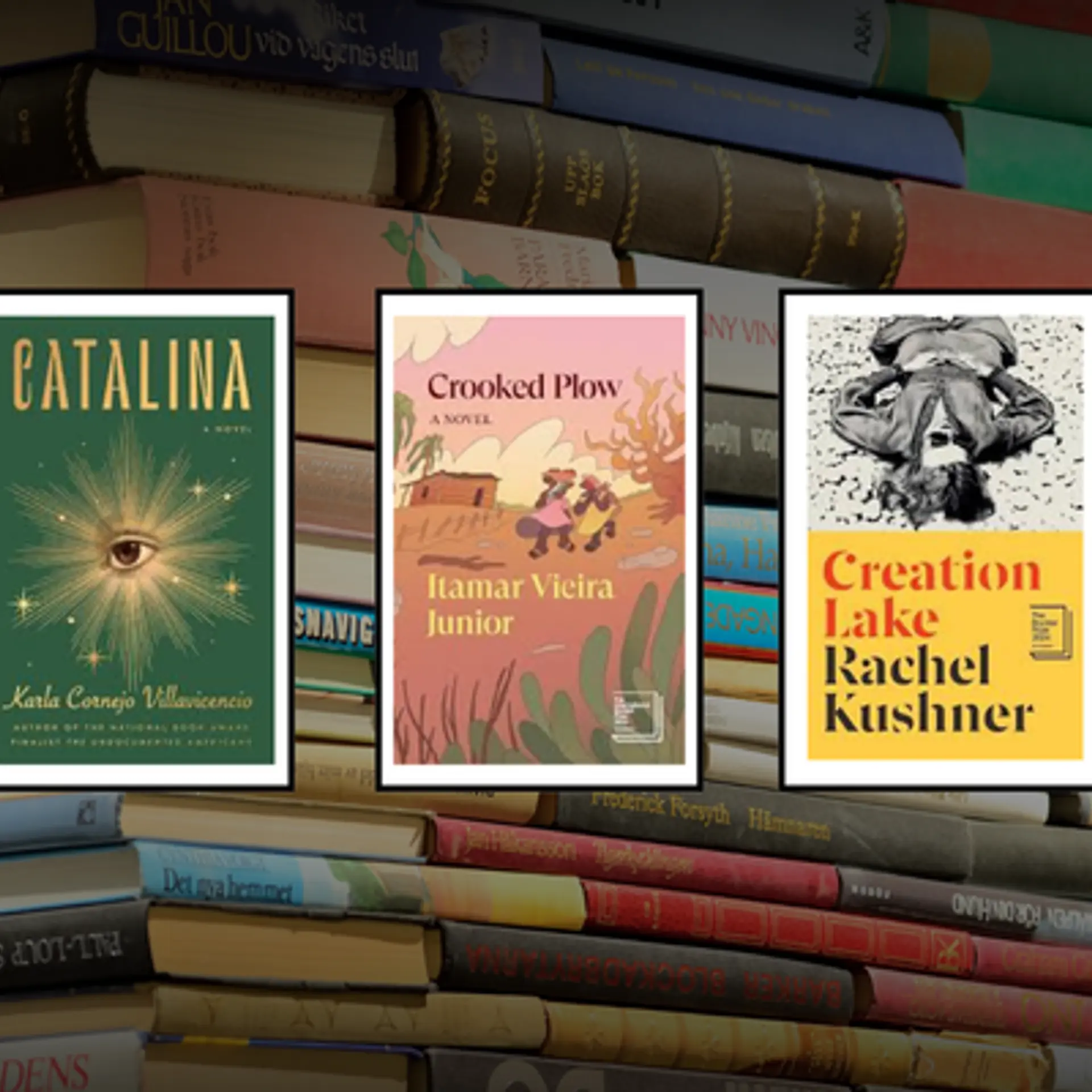If you’re a big fan of the science fiction franchise Back to the Future, you’ll love tech predictions. From analysts to pioneering leaders in the industry, everyone has a take on where technology is heading. Over the years, we’ve seen some stellar predictions and some really poor ones. From Steven Chen’s (Founder of YouTube) simple explanation of why there are not enough videos in the world, to Ray Kurzweil’s exciting and scary thought of a datapool of knowledge stored in the cloud and fed directly into your brain (like we were all some sort of walking, talking robots with chips in our brains), predictions in tech range from wow to crazy.

A quick recap of some gems
I stumbled on a 1999-Salon piece which smugly asked, "Are companies losing billions of dollars to recreational surfing and e-mail chitchat?" Check out the headline –

Fast-forward to 2015 and Facebook has a market cap of about $300 billion!
Or might I remind you of Paul Krugman’s beautiful sermon on the Internet in 1998 – “…most people have nothing to say to each other .”

Or Gartner, which has its fair share of predictions in tech, in 2006 demanded Apple quit the hardware business. Or the time when NYT said Apple will never come out with a cellphone. Yes, that sentence is correct.
But predictions in technology are not easy. There is no other industry that’s changed shape as much as tech. We’ve seen a fundamental redefinition in the ownership of assets (I won’t belittle the point by talking about Airbnb and Uber, but subtly invoke them nevertheless). It’s getting more difficult to predict technology and that’s mostly because of how the smartphone has shaped in the past few years. I’ve watched from the sidelines but I thought it’d be fun to stick my neck out on some predictions:
The tech bubble: much ado and ado + ado
Two-thousand articles were written on tech bubbles as of October 2015. That’s almost 5.4 articles a day. Nope, we’re not in a tech bubble and nope, nothing’s going to “pop” in 2016. Nobody expected mobile to grow so massively and show the kind of adoption it has witnessed. I think the bubble is exaggerated and we’re not in the midst a dot-com boom. Three data points to compare the dot com-bubble vs now (from Benedict Evans):
-The median age for a company to IPO was four years. It’s now 11.
-No mobile revolution earlier. There are 3+ billion people online now.
-The combined value of 61 US tech “unicorns” is still significantly less than one Facebook. Half of all the computers in US schools are ChromeBooks. Emerging economies like India and Malaysia are also embracing the power of technology in education.
And the emerging economies are in the fold too.
According to Ericsson, one in four Japanese smartphone users do not make traditional voice calls anymore.
Even though less than 20 per cent of India uses the Internet, Ola does one million rides in a day.
The battle between Siri, Cortana, Google Now and Facebook M
Everyone wants a piece of the digital assistant pie. While Siri is a bit lost because of weak data and Cortana is not in as many phones as it wants to be, Facebook M and Google Now are leading the charge. While Facebook M is still in its infancy with some claiming that it’s not really an artificially-powered assistant, Google Now checks all the right boxes. Considering Gmail is your primary inbox account, calendar is your defacto scheduler and Google Photos stores your pictures, I’d say Google understands users more than any other company in the world. After all, Google is built on harvesting your data and that’s where I’d put my money.
Cyber security – identity theft
As far as enterprises go, 2016 will be all about cyber security. I have my eye on Tanium, a father-son cybersecurity startup. From a consumer standpoint, even the most average mobile user has about 10-15 apps and about five to six different passwords. Most users log in from their Facebook accounts and if one password is hacked, the damage is immense. Identity theft is very real and 2016 could be an important year for security.
Facebook vs Google: search vs mobile
Facebook will be desperate to step on Google’s turf and get a share of 'Search' – a market where it has little say. Google will be desperate to step on Facebook’s turf and get a share of mobile – a market where it lags behind despite forking out Android. Oh, and Android is no more ‘open source’. With Marshmallow, Google knows everything that’s on your phone. Bottomline, Google will make inroads in mobile and Facebook will build something to enhance discovery: a new way to shop. On that note, video ‘search’ will continue to happen on YouTube and viral video discovery will continue to happen on Facebook. Everyone goes home happy.
The Internet of Things (IoT): too much fluff and little direction
Everybody knows IoT and everybody speaks IoT. Apparently all machines can talk now. From warmer blankets, to optimally cool refrigerators and coffee machines, IoT examples are bizarre, funny and altogether unnecessary. There is tremendous potential, but for now, it has to be in an industry warehouse and a more B2B functionality.
Wearable tech: the fad that will rapidly decline
I was never a big fan of wearable tech. I simply didn’t see the utility beyond tracking your 10-metre walk to the coffee machine. It needs to have a lot more, including booking appointments, a better voice assistant, a mike for accepting calls and a darn battery that lasts for a week at least. Add a layer of security over it, perhaps? There’s just not enough in it right now.
Virtual and augmented reality: more games, few movies
We’re still at the cusp of what virtual reality (VR) can do. Some offices are using VR to collaborate on projects remotely. I think there’s tremendous potential for gaming and movies. Augmented reality (AR) can redefine these experiences, but is still a long way from being developed. The entire industry will be making games that are much more animated and offer a more immersive experience unlike anything you’ve experienced before. Can video games make you stand up and play football in a 2,000-sq.ft. room, without actually kicking a ball? By 2017, perhaps…
Ad blockers and authors: the fight for free Internet
Some sites don’t open if you have an ad blocker installed. Ad blockers are on the rise and the ad tech industry has got themselves in a quagmire of sorts. The old model was to serve as many ads as possible. The publisher was happy, the brands were happy and the ad tech companies were raking in the moolah. The only person angry was the user. And bingo, ad blockers were born. But now, these companies allow certain brands to slip through their systems if you pay them a certain bribe. Effectively, a cartel was formed and the authors were squeezed even more. Will 2016 see a body being formed to independently regulate the industry?
3-D printing: where you buy a printer, print a printer and return the original printer
There are some consumer use cases like Mink which is a 3D printer for makeup. But largely, this remains in the enterprise space, most likely to see strong adoption in healthcare, but we’re not there yet when it comes to additive manufacturing. Maybe 2017? It’ll be an interesting year for 3-D printing and how the likes of Stratasys and MakerBot get their printers to consumers. Hire a good PR agency for starters?
Digital wallets in India: it’s the biggest Indian battle. Not e-commerce. Not food delivery.
Legacy players like ICICI and Axis are getting in on the act too, trying to reinvent their archaic systems. I find the marketplace model fascinating. Snapdeal was late in the game and realised the merits of a marketplace model as opposed to Flipkart which transitioned to the model. But I believe Paytm has a big say in the future of not just digital payments, but, importantly, commerce as a whole. I think cashbacks also have a ‘psychological’ tinge to them in that they are far more appealing than new-age ‘discounts.’ Two issues with wallets and commerce companies that remain to be solved are last-mile delivery and average customer service.
On that note, my bets were on Snapdeal, but unclear how much damage the recent Aamir Khan fiasco has done to them. I prefer Swiggy to Zomato.
I know I’ve missed out on some and others are too futuristic, but let’s see what 2016 pans out like.
(Disclaimer: The views and opinions expressed in this article are those of the author and do not necessarily reflect the views of YourStory)
About the author
Adithya Venkatesan works with Gutenberg Communications helping startups and enterprises narrate their stories to the world. He reads fervently, travels assiduously and is a recipient of the PR 30 under 30 awards. He also thinks Huxley's dystopian future is more plausible than Orwells'. He can be reached on mail [email protected] and on twitter @adadithya







